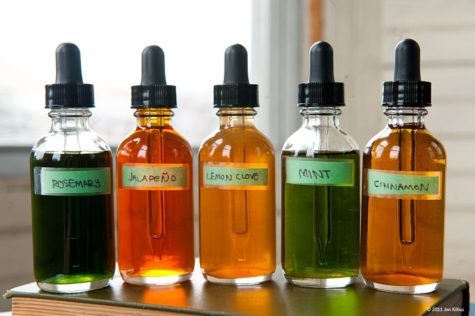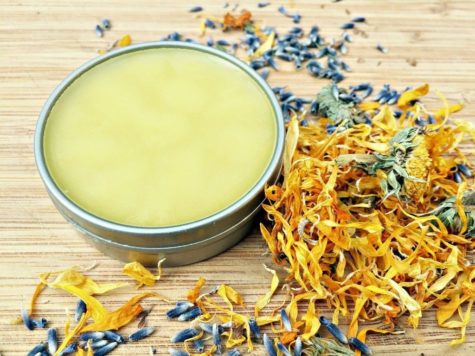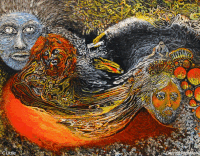Monthly Archives: December 2018
How to Make a Tincture

Tinctures are concentrated herbal extracts that are made using alcohol and chopped herbs. The tincture is especially effective in drawing out the essential compounds of plants, especially those that are fibrous or woody, and from roots and resins. Since this method ensures that the herbs and their nutrients can be preserved for a long time, it is often mentioned in herbal books and remedies as a preferred way of using herbs.
Your tincture will not be of the same potency of the tinctures that registered herbalists make because they have access to much stronger alcohol. We use the best quality vodka possible. Although some people say you can use run, brandy or whiskey this changes the flavor. No matter what you choose it must be 40% to prevent mildew starting on the plant material. (For those who cannot drink alcohol use quality apple cider vinegar or glycerin.)
The container for the tincture should be glass or ceramic. Never use a metallic or plastic container because these can react with the tincture or leach dangerous chemicals over time. Items such as a mason jar, a glass bottle with an attached stopper, etc., are ideal for steeping a tincture. You will need to get some small dark glass tincture bottles for storing the tincture in once it has been made; these bottles should have a tight screw-on or tight clip-on lid to prevent air intrusion during storage but to allow for ease of use. Ensure that all containers are both washed clean and sterilized prior to use.
You can prepare a tincture by measurement or by sight; it really depends on your level of comfort with simply adding herbs and judging by eye, or whether you feel more comfortable adding them by measured weight. Also, you should know whether you want to add fresh, powdered, or dried herbs to the tincture. Some suggestions for adding the herbs in the order of fresh, powdered, or dried are as follows:
- Add enough fresh chopped herbs to fill the glass container.
- Cover with alcohol.
- Add 113g of powdered herb with 473ml of alcohol (or vinegar/glycerin).
- Add 198g of dried herb material to 1 liter of alcohol (or vinegar/glycerin).
- Using a butter knife, stir around the edge of the glass container to ensure that all air bubbles are released.
Seal the container. Place it into a cool, dark area (in a cupboard). The container should be stored there minimum 8 days to a month.
- Shake the container twice a day.
- Be sure to label the steeping tincture so that you know what it is and the date on which it was made.
- Keep it out of the reach of children and pets.
Strain the tincture. Once the steeping time is finished (the specific tincture instructions you’re following will inform you of this) strain the tincture as follows:
- Place cheesecloth across a sieve.
- Place a large bowl underneath to catch the strained liquid.
- Gently pour the steeped liquid through the lined sieve. The cheesecloth will capture the plant material.
- Press the herb material with a wooden spoon to squeeze out some more liquid, and then twist the cloth to extract any leftover liquid.
Decant the liquid into a prepared tincture bottle. Use a small funnel for this step if you don’t have a steady hand. Tighten the lid and date and label the tincture.
Store and use:
A tincture can have a shelf life of up to 5 years because alcohol is a preservative. However, know the properties of the particular herbs you’ve used, and follow the guidance of the recipe from which you’re making the tincture in terms of how long to keep the tincture for.
Follow the instructions relevant to your tincture for usage; consult a qualified, reputable herbalist or a health professional if you need more information and bear in mind that herbal treatments can be dangerous if you don’t know the properties of the herb and its consequences.
Found at: Wild Edible Food
How to Make a Healing Salve
The best way to make a salve is to allow your herbs to solar infuse in your choice of carrier oil anywhere between 4 and 6 weeks. Fill (not stuff) a jar with herbs and pour the carrier oil over top.
- Be sure to cover all plant matter and poke out any trapped air bubbles.
- Be sure to use plant matter that has NO moisture on it at all!! (No rain, dew, etc.)
Cover the jar and let sit in a room that gets sunlight but do not place in direct sunlight. It’s a good idea to date the jar so you don’t forget when you started it.
A faster method is to place your herbs and the carrier oil into a Pyrex container over top of a large pot that is about ¼ full of water. Once the water is boiling turn the stove down to a simmer and allow the herb/oil mixture to infuse for about 40 minutes.
DO NOT SPLASH WATER INTO THE HERB/OIL INFUSION!
After either of the above methods, place three layers of cheesecloth over a large bowl. Pour the infused oil over the cheesecloth to strain and be sure to keep herbs out of the oil. Once drained ~ with your clean hands ~ squeeze out remaining oil. After measuring out what you will use to make salve store the remaining oil and again, be sure to date it.
Measure out 114 grams of infused oil (or 4 oz which is ½ cup) and set aside.
Weigh 8 grams of beeswax on a scale. Shave or cut into small pieces your beeswax. Place in a Bain Marie and melt.
Once melted add to the oil and stir well with a clean wooden stick. Test it for hardness by taking a small amount on a spoon and tip it – the mixture should adhere to it. If it is too soft add a tiny bit more melted beeswax.
Add 4 drops of Benzoin oil as a preservative and add a few drops of essential oil for fragrance if desired. Pour mixture into jars. Cap only when cooled. Store in a dark, cool location.
NOTE:
In addition to making salves for muscle aches, skin ailments, or other health ailments, make a health-nourishing salve for your skin. When infusing oil, use vegetables that are well-known for skin health such as broccoli, spinach, bell peppers, asparagus or carrots.
From: Edible Wild Food
Saida: Salves To Heal Up Wounds
Brenda-Lee: Egg White Cough Cure
Pat Scott: Marsh Mallow Ointment
Sharon from Cleveland, Ohio: Egg White Cough Cure
Vagabond Witch: Soapwort Shampoo


